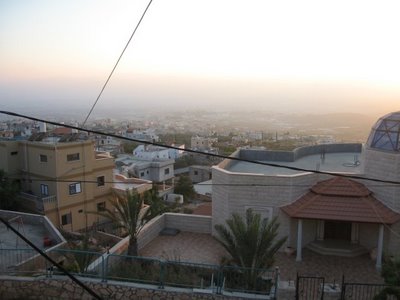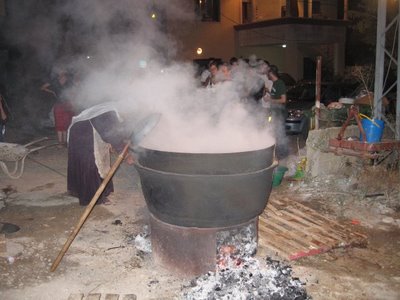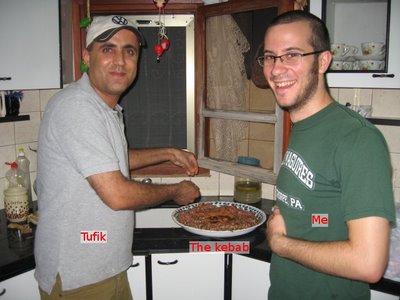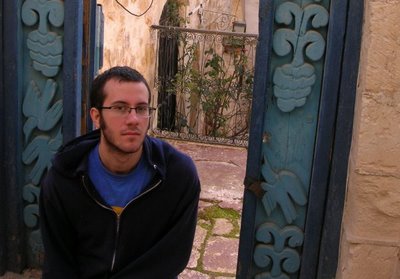Sefer ha'Zfira: the Zom Tamuz War
I apologize, but I haven't yet gotten a copy of the super-fun miklat pictures. So you'll be stuck reading my writing for the time being. I should give credit: I have no camera, so all of the pictures I've posted so far have been due to Yaniv and Gilad. (I suppose that's also blame. Where're the pictures, ah?)
At first, the katyusha attacks in the North meant very little. Another kidnapping, another response. I heard only the second of the first two Ra'ad Wahad (Thunder 1) missiles strike Haifa on Thursday as I walked up the stairs to make an Indian dinner at the house of a Russian couple. We cooked, listened to the radio, and despite constantly walking to the window and looking north, my coconut-mango rice pudding turned out delicious. (I also need to get pictures of that...)
And then it was quiet, no real problem. Work as normal. My schedule before the violence was already one of crazily late nights, so it wasn't unusual for me to be dozing lightly at 9am on Sunday -- when more rockets landed. Up, out of bed, grab my friend from down the hall, into the miklat. I had been planning to do a big shop in case of exactly this happening, but "this" got the best of me. There was no siren. These were loud blasts, and even the Israelis were a little jarred. But during a pause, I skipped upstairs to grab a bowl, a spoon, Multi-Grain Cheerios, and milk. Some Israelis brought in some fruit, a nicer radio. They discussed cellphone plans that could get on the network, get reception in a steel box underground -- Cellcom was great, Orange and Pelefon no good.
And the day calmed down even more. I headed over to another miklat with Gilad, my German exchange-student flatmate. There we met Liora (Israeli) and Camli and Walid (Druze), along with Sara (American -- was at the Russians with me). A little snack, a narguileh -- outside, on a bench in the shade. It was a picnic, a break.
A couple of people suggested getting a van-taxi to drive us to Tel Aviv. A holiday, quiet, some time to get real work done, great cafes and bars -- who could resist? As that was being worked out, Liora and I head upstairs -- to the third, uppermost, and most dangerous floor (sorry, Mom) -- to make some omelets for sandwiches, food for the road. Just as I finished the first omelet -- yogurt for fluffiness, chopped parsley, some sauteed onions inside -- another siren rang. Off goes the gas, run downstairs -- only one blast. Wait twenty minutes, back up to finish the rest. And before we knew it, we were past Binyamina and Zikhron, in Hadera, safe.
So what does all of this mean? Is Haifa a warzone? What about the North, about Yarca and Zfat and Kiryat Shmone? And what about Lebanon?
The North is rough. A shopping mall in Yarca was hit twice -- empty at the time, of course. Zfat and Kiryat Shmone everyone has seen. But people aren't stuck inside their miklats, doing nothing all day. Neighbors get together, now that they finally have nothing else to do. And though thousands have fled, most wait patiently. It's a long, boring, and occasionally nerve-wracking block party.
Why do I write so blithely about the North? "There are missiles, no, rockets falling on them!" A katyusha is like a rock, a thrown rock. You don't want to be hit by a katyusha. You don't want to be anywhere near them. But it's not a missile, it doesn't level houses, it doesn't explode violently. Miklats are completely safe -- despite a story I've heard of a door being blown shut. This isn't the Gulf War.
Haifa is a different story. The Ra'ad Wahad, the Thunder 1, is longer range -- bigger. The hole a katyusha blows is no more than thirty centimeters in diameter, a foot; a Ra'ad tore the roof off of a warehouse, leveled two floors of a building in Bat Galim. This is the reason the attack is an escalation: not just because of the range, but because of the size of the munition. (Some people think the missiles are Ra'ad rockets; others Fajr Arbiye or Hamsa. No one was saying on the Israeli news, and both missiles are of Irani manufacture.)
Nonetheless, grocery stores are open, some cafes are open. Oh, how I miss my favorite falafel, which might also be open! The staff are returning to the Technion. My friends -- Gilad included -- are going back soon. (Gilad is in fact a saint, since he'll be packing up my things and sending them along.)
This all begs the question: "If all of these weapons are so weak, why is Israel responding with such force? This seems unreasonable, uneven, unfair." Israel is big and powerful; it can blockade a country of its own size in a few hours. Hizbollah has around 4,000 militants; perhaps half of Israel could be called up for Army duty.
But the Israeli force is targeted,not just looking to kill. Katyusha batteries are bombed shortly after missiles are launched; this way nearly 30% of Hizbollah's attack capacity has been eliminated. Citizens are caught in the blast, as Hizbollah forces people to stay near installations in the South, keeps villages hostage. The situtation is complicated and tragic.
And from afar, I would say, "Let them take a pot shot. It's not doing a lot, let them waste their resources. They'll be embarrassed." I said this to Israelis when Kassam rockets flew from Gaza into empty fields near Sderot. They laughed, or were angry. You can't let someone attack you, they argued, and not respond. All that does is invite more attacks, make you seem weak.
When I called my girlfriend to tell her that I was alright, she was mad. "I can't believe they're doing this. Doesn't either side realize this isn't going to get them anywhere?" I was taken aback. This was one of the first things out of her mouth. Didn't she care that rockets were being shot at my city, at me? It doesn't seem ugly
to me at all to worry first about my family and well-loved friends in Haifa before I worry about politics, or Lebanon, or what France thinks.
Now I agree with many of the Israelis -- lefties themselves, but with a caveat: when you are attacked, and your attacker smugly claims to be the first defeat you, you cut him down. He can be the smallest little nothing, but you stop him. And I hope you who read this understand that I'm as pacifistic as can be, am against the war in Iraq, want Israel out of Gaza and eventually out of the West Bank. But some positions are only tenable from a distance.
It feels good to be back. My mom went a little crazy, insisted I return early. I flew first class: the duck was overdone, but everything else was perfect. I'm well rested and performing some of the East Coast rounds.
I can't think enough of my friends back at home. Gilad is the greatest, packing up my things for me. He must be very pleased that I left my narguileh behind. Yaniv is still very shaken, but I'm sure he's calmer by now -- his grandparents seem to make him nervous, since they keep the news on all the time. Camli went down to Tel Aviv to work -- the companies are paying 150% time for workers, plus hotel rooms. She's only been to Tel Aviv twice before, so Liora is showing her around. What a shame! Even inside Israel's borders, Arabs don't get a fair deal. (See? I told you I was a lefty.) Walid visited home, but headed back to the Technion to get work done.
And to think, I was complaining to Liora only weeks ago that Israel was boring, and that I wouldn't miss it. Israel is an exciting place, full of energy and hope that I can barely believe; and to miss it? The easiest thing in the world.















